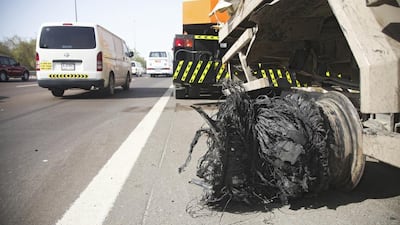ABU DHABI // Fourteen people were killed and seven seriously injured in 28 traffic accidents in the emirate last year caused by faulty tyres, authorities said.
Abu Dhabi Police and road safety experts are urging drivers to check their tyres to avoid blowouts, which can lead to accidents.
Brig Khalifa Al Khaili, director of the Abu Dhabi Police traffic and patrols directorate, asked drivers to ensure the safety of their vehicle’s tyres, especially during the hot summer months, as well as warning motorists that driving with expired or faulty tyres was a traffic offence punishable by having their vehicle impounded for up to a week and a Dh200 fine.
To prevent accidents police have increased inspections and efforts to educate motorists on the dangers of driving on damaged or expired tyres.
One road safety expert said such campaigns were essential.
“Even in our circles people forget to check their tyres,” said Roshanara Sait, director of Ciel Marketing and Events, which organises road safety campaigns.
Even the safest of motorists can pose a serious threat to themselves as well others by driving on faulty tyres, said Ms Sait, who recently participated in a road safety campaign with Dubai’s Roads and Transport Authority.
“We were out on the streets looking to reward drivers and we found a lorry driver who was driving perfectly and doing all the right things,” Ms Sait said.
But, surprisingly, the lorry driver was issued a fine rather than a reward.
“I was shocked, the tyres were in such bad condition.
“They were cracked and some of them were ready to burst, so the officials ended up issuing him a fine,” she said.
Although she has taken defensive driving courses, Ms Sait said she was shaken up after one of her vehicle’s tyres burst when she drove over a sharp object.
“It was quite scary. It was difficult to control the car and there were other cars around me,” she said. “I was doing about 90 kilometres an hour but had it been someone driving faster and untrained it could have been disastrous.”
Another road safety expert said the sudden shock caused by a tyre explosion could lead to abrupt movement of the steering wheel.
“Exploding tyres pose a big danger because steering may become uncontrollable, especially when one of the front tyres burst,” said Thomas Edelmann, founder of RoadSafetyUAE.
Mr Edelmann said with burst tyres causing 5 per cent of all UAE traffic deaths, more attention had to be paid to proper maintenance.
“Fourteen deaths means exploding tyres pose a big danger” he said.
Tyre debris on UAE roads is a common sight during the summer months as higher temperatures put added stress on tyres.
Drivers should inspect their tyres before each journey, looking for cracks, cuts, exposed cables, or uneven wear of the tread, Mr Edelmann said.
It is essential to ensure tyres are certified and from a reputable brand, fitted properly, meet the correct size and specifications for the vehicle, are inflated to the correct pressure and checked routinely.
_____
Tyre safety tips:
• Purchase reputable and certified tyre brands - premium brands normally last longer.
• Ensure tyres are correct size and specification for the car as set out in the manual.
• UAE regulations require passenger car tyres to be sold within 2 years of the date of their manufacture and changed within 5 years. To check the age of tyres look for production date on their sidewalls which indicate the week and year they were manufactured. For example 0217 means the tyre was produces on the 2nd week of 2017.
• Use a reputable mechanic to fit tyres properly.
• Inflate tyres to car manufacturer’s recommended level which can be found in owner’s manual or on sticker attached to door frame or fuel cover.
• Check tyre pressure at least once a month when tyres are cold - driven less than 3km - or add 0.3 bar if tyres are warm.
• Check all four tyres for cracks, cuts, exposed cables, or uneven wear routinely.
• Rotate tyres every 10,000 km, or as advised by the vehicle manufacturer, to even out their wear. A wheel balance and alignment at this time will further prolong life of tyres.
tsubaihi@thenational.ae

